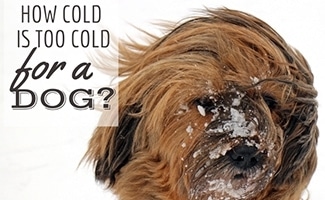How Cold Is Too Cold For A Dog?
To sustain this free service, we receive affiliate commissions via some of our links. This doesn’t affect rankings. Our review process.

But what temperature is too cold for dogs? And when you inevitably have to take them out to potty (and for exercise), what’s the best way to protect them?
Article Overview
What Temperature Is Too Cold For Dogs?
The answer to this question depends on several factors, including the breed, size, coat-thickness and health condition of your dog.
Most dogs can tolerate temperatures above 45°F pretty well. When temps fall below this, some dogs that are especially prone to the cold will begin to feel uncomfortable.
In temperatures below freezing (32°F), you should monitor your dog carefully if she’s a small breed dog with a thin coat, is sick or very young or old. When temperatures drop below 20°F, all dogs are prone to developing hypothermia and frostbite.
Use Caution: Although longer-haired and thick-coated dog breeds (see the best cold-weather breeds below) can better tolerate colder temps, you should never leave any pet outside for long periods of time when it’s below freezing.
Factors To Consider
Many factors can affect how your dog responds to colder weather. Many of these factors come down to common sense, but they’re still a good reminder.
Dog’s Physical Conditions
- Coat Type: Heavier thicker coats do afford some insulation from the cold. In contrast, very thin-coated dogs, like Greyhounds and French Bulldogs, will get cold much faster.
- Coat Color: When it’s sunny, dark-colored coats absorb heat from the sun much better than lighter-coated breeds.
- Size & Weight: Larger dogs and those with more meat on their bones will be more comfortable in the cold than miniature, small and skinny breeds.
- Health Condition: Cold weather can worsen some health conditions, like arthritis.
- Activity Level: If your dog is active outdoors in the cold, she may be able to keep her body temperature up enough to stay more comfortable for longer periods.
Environmental Conditions
- Wind Chill: This is a biggie, just as it is with humans. You have to consider the wind chill (not just the air temperature) when your pets are outside in the cold. Very low wind chill temperatures can lead to frostbite in a matter of minutes.
- Rain & Snow: Even if the air temperature isn’t below freezing, any situation in which your dog’s coat can get soaked causes her to become much more chilly.
- Cloudy vs Sunny: Just like humans, dogs need the sun to stay warm. In cold temperatures, some will be able to stay outside longer when it’s sunny vs when it’s cloudy.
Know When It’s Time To Head Inside
It’s important to monitor your dog’s behavior when they’re out in the cold. If you notice any of these symptoms, it’s time to go inside.
- Shivering
- Acting anxious
- Slowing down
- Whining
- Holding up one or more paws
How To Protect Dogs From Cold Weather
Keeping dogs warm outside takes some forethought. You’ll want to make sure they maintain their body temperature to ward against hypothermia and have protection on their paws to help prevent frostbite.
Dog Boots
We recommend the Bark Brite Neoprene Paw Protector Dog Boots. These all-weather, water-resistant boots come in four-packs in five different sizes and have reflective velcro straps to keep them secure. They’re very durable and have thick, non-skid rubber soles to protect against snow and ice, chemicals, sharp objects and hot asphault.
Dog Coat
Need an affordable warm, water-resitant coat for your pup? Check out these Kurgo Dog Jackets. These reversible fleece-lined dog coats come in five different sizes and tons of fun color options. They’re waterproof, machine washable and come with a lifetime warranty. They also have a zipper on the back so you can easily attach a leash harness.
See our reviews of the best dog boots and coats for some of our other top recommendations.
Other Winter Pet Safety Tips
- After walking your dog (if you’re not using dog boots), wipe her pads and paws to get rid of any salt or toxic chemicals she could have picked up. Snow removal chemicals can damage dogs’ pads — and you always run the risk of them licking these harmful substances.
- Don’t ever let your pet walk on ice-covered ponds, even if the ice appears thick.
- Keep your dog on a leash. If your dog gets lost, snow and ice can hide recognizable scents that would normally help them find their way home.
- Use antifreeze with extreme caution. Clean up any spills immediately. Antifreeze tastes sweet and dogs will lap it up. But it’s extremely toxic.
- Never leave your pet in a cold car. If you’re doing a store run, leave your dog at home. Cars can cool down very quickly in extreme temperatures, posing a serious threat to your dog’s health — even if you’re only going in the store for a short period.
- Have a blizzard emergency plan in place for your pets. Make sure you have enough dog food and her medications on hand if you get stranded and warm bedding in case you lose power.
Best Cold-Weather Dog Breeds

- Alaskan Malamute (the oldest and largest of the Arctic sled dogs)
- Keeshond (bred as a riverboat watchdog in Holland)
- Newfoundland (bred to work in icy waters)
- Norwegian Elkhound (ancient breed from Scandinavia)
- Saint Bernard (bred as a rescue dog in the Swiss Alps)
- Siberian Husky (hails from northeast Asia and bred as a sled dog)
- Tibetan Mastiff (bred in the Himalayan Mountains)
Is This Your Dog In The Snow?
Most dogs love the snow, whether they’re well-equipped for it or not. See this fun compilation video of dogs enjoying the winter wonderland. Does it remind you of your pup?
But always remember, you should suit up the smaller ones for snow playtime, just like you would your kids. And limit their time in extreme temperatures.
Pet Insurance Can Cover The Unexpected
Although we urge you to mind the cold weather tips we’ve suggested above to keep your dog safe during cold weather, bad things can still happen. For example, she could slip on ice you didn’t see or the cold aggravates a health condition you didn’t know she had. The resulting veterinarian costs could add up quickly, and the last thing you need is a huge vet bill when you least expect it.
For this reason, you should consider getting pet insurance for your dog. If you have pet insurance in place, it covers treatments for unexpected accidents or any health conditions or illnesses your dog may suffer from that you weren’t previously aware of. See our best pet insurance article to learn more.
What’s your dog’s favorite cold-weather activity?
Source: [1] American Kennel Club





My programmer is trying to persuade me to move to .net from PHP. I have always disliked the idea because of the costs. But he’s tryiong none the less. I’ve been using WordPress on a variety of websites for about a year and am concerned about switching to another platform. I have heard fantastic things about blogengine.net. Is there a way I can import all my wordpress content into it? Any kind of help would be really appreciated!